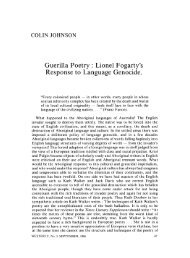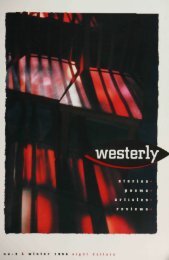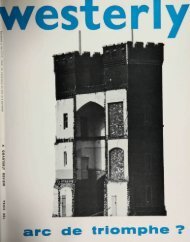important as it is to the Australian psychology,has never thus been assimilated. So akind of spHt in the writer's consciousness isoften manifest; he cannot solve his immediateproblem, he cannot keep attentionconcentrated on his foreground, while hisbackground keeps intruding. Perhaps thisduality, this unsolved problem, is partly thecause of the gaps in Australian literature,and the curious lack of writers with anythinglike a 'body of work' to their credit.Only the single-minded with a track of theirown to follow, or the genuinely great writer,can by-pass that boulder in the road.(Henry Handel Richardson managed it inthe Mahony trilogy, Slessor and FitzGeraldmanaged it, though neither of them can becalled prolific writers; Hugh McCrae andhis circle managed it by simply detachingthemselves completely from the ground andflying over it, but nevertheless their work asa whole was seriously weakened by the evasion.)"It seems to me that the Jindy movementwas essentially an effort to get the probleminto perspective. I don't necessarily meanthat the Jindy writers themselves have donethat, but rather that in the ensuing argumentthe issues found some kind of clarification;and in fact the work of the outstandingJindy writers has to some extent alreadybroken the problem down. To emphasizeour regionalism instead of trying to elude it—this has had a value in itself, and it hasperformed the further function of leadingto a reaction against itself. That is to say,that having found out what happens whenone tries to treat the problem as an end initself, it is now possible to apply the knowledge.The regional, the national outlook hasa value, and no doubt some writers do theirbest work within such a closed circuit. Butthere are other jobs to do; and Jindyworobakhas probably contributed somethingtowards finding the means to do them. Itmay be that because of the Jindy movement,even those most fiercely opposed ormost indifferent to it know themselves alittle better."^^The italics at the end are mine. Whether, infact, Judith Wright herself was opposed or indifferentto the Jindyworobak attitude is notclear, but her poetry in this first volume standsin sharp contrast to that of the bulk of Jindyworobakverse in that, while sometimes sayingthe same thing, it says it from much greaterdepth. Reg Ingamells had written in his firstbook of verse published ten years earlier:Where now uninterrupted sunIs shrivelling the sheaves.Black children leap and laugh and runBeneath a sky of leaves;And where the farmer thrashes wheatWith steel machinery.Go ghmmerings of their little feet.If we could only see.It's a pleasant enough concept and here putforward probably for the first time, but it isshallow and poetically not distinguished. JudithWright in "Nigger's Leap: New England" putsa similar thought into much richer language:Did we not know their blood channelled ourrivers,and the black dust our crops ate was the-rdust?She follows this with an extension of thoughtto the one-ness of man, an extension, it maybe added, which seldom if ever entered intothe verse of the Jindyworobaks:O all men are one man at last. We shouldhave knownthe night that tided up the cliffs and hidthemhad the same question on its tongue for us.And there they lie that were ourselves writstrange.Her main preoccupation in this first volumeis with what we have grown out of; it derivesfrom the inward-looking that was part of thetime in which she was writing. It occurs overand over again. In "Country Town" she says:This is no longer the landscape that theyknew,the sad green enemy country of their exile,those branded men whose songs were of rebelUon.This is a landscape that the town creepsover;a landscape safe with bitumen and banks.The hostile hills are netted in with fencesand the roads lead to houses and the pictures.Thunderbolt was killed by Constable Walkerlong ago; the bones are buried, the storyprinted.And yet in the night of the sleeping town,the voices:This is not ours, not ours the flowering tree.What is it we have lost and left behind?Where the Jindyworobaks were accusing earlysettlers of despoiling the countryside, thunderingimprecations about "the rape of the land",Judith Wright was enquiring into the sources44 WESTERLY, No. 1, MARCH, 1968
from which she herself had sprung. The poemconcludes with a call toRemember Thunderbolt, buried under theair-raid trenches.Remember the bearded men singing of exile.Remember the shepherds under their strangestars.That this call for remembrance is, for her,very personal is shown in many places andnowhere better than in "South of my Days"which begins:South of my days' circle, part of my blood'scountry,rises the tableland, high delicate outlineof bony slopes wincing under the winter,low trees blue-leaved and olive, outcroppinggranite—clean, lean, hungry country ....and ends:South of my days' circleI know it against the stars, the high leancountryfull of old stories that still go walking in mysleep.If there has been despoilment, this seems toimply, then we are all touched with some guiltand out of the original hate-love relationshipbetween our forebears and this alien earth hascome the fulfilment of love.Her poem, "BuUocky", expressed in a balladlikeform she was not often to use again, becameat once a favourite anthology piece. Thefirst three stanzas suffice to show its mood:Beside his heavy-shouldered team,thirsty with drought and chilled with rain,he weathered all the striding yearstill they ran widdershins in his brain:Till the long solitary tracksetched deeper with each lurching loadwere populous before his eyes,and fiends and angels used his road.All the long straining journey grewa mad apocalyptic dream,and he old Moses, and the slaveshis suffering and stubborn team.This is landscape poetry, but it is a landscapewith people. In "South of my Days" there wasold Dan:Seventy years of stories he clutches roundhis bones.Seventy summers are hived in him like oldhoney.In "Brother and Sisters" there are Millie, Lucyand John struggling against time and lack offulfilment on a no-good farm:The road turned out to be a cul-de-sac;stopped like a lost intention at the gateand never crossed the mountains to thecoast.But they stayed on."Half-caste Girl" is pure Jindyworobak, butwritten with much deeper insight:Little Josie buried under the bright moonis tired of being dead, death lasts too long.She would like to push death aside, andstand on the hilland beat with a waddy on the bright moonlike a gong.Across the hills, the hills that belong to nopeopleand so to none are foreign,once she climbed high to find the nativecherry;the lithe darkhearted lubrawho in her beads like blooddressed delicately for lovemoves her long hands among the strings ofthe wind,singing the songs of women,the songs of love and dying.Most of the poetry in The Moving Image isessentially regional; its appeal could be largelyto those who, however vicariously, have sharedthe emotions which regionalism of any sortcalls up. We are reminded of her words in theJindyworobak review: "The regional, thenational outlook has a value, and no doubtsome writers do their best work within such aclosed circuit. But there are other jobs to do.""Judith Wright worked magnificently withinthat closed circuit, but did not confine herselfto it. Even in this early volume "The Companyof Lovers" entirely forsakes regionalism.It does, however, remain a poem of its time,the time of a world at war:We meet and part now over all the world:we, the lost company,take hands together in the night, forgetthe night in our brief happiness, silently.We, who sought many things, throw allawayfor this one thing, one only,remembering that in the narrow gravewe shall be lonely.Death marshals up his armies round usnow.Their footsteps crowd too near.WESTERLY, No. 1, MARCH, 1968 45
- Page 1 and 2: westerlyA QUARTERLY REVIEW PRICE 60
- Page 3: westerlya quarterlyreviewEDITORIALC
- Page 6 and 7: Some JOURNALS published byUNIVERSIT
- Page 8 and 9: "WeU, maybe this one is, too.""With
- Page 10: a leer. What really infuriated her
- Page 13 and 14: Guest of honour? No less than the G
- Page 15 and 16: THE NAVIGATORS(To Albert Tucker)Bei
- Page 17 and 18: Mother of navigators.Beater of men.
- Page 19 and 20: Horizon-haunted men.Looters and Pir
- Page 21 and 22: On the table Taki had left a crumpl
- Page 23 and 24: FEARA thousand, thousand stars and
- Page 25 and 26: Judith ClarkeTHANK YOU MRS. GREENBE
- Page 27 and 28: Oh no, thought Lai Chandra, oh no.
- Page 29: "Nuance," she said- and "poetry,"an
- Page 32 and 33: TO WAKE, TO FLOWfor my wifeFor me t
- Page 34: With apparent indulgence Lola encou
- Page 39 and 40: or another, and some of the paintin
- Page 41: I do not think it has been fulfille
- Page 45: important thing for a writer who ha
- Page 49 and 50: They are looking for him now in the
- Page 51 and 52: departure from what had come to be
- Page 53: ary degree the atmosphere of a trib
- Page 56 and 57: Blessed is the mother with her chil
- Page 58 and 59: IF YOU DON'T KNOW HOWDON'T DO ITft>
- Page 60 and 61: And yet perhaps both men drew from
- Page 62 and 63: other respects his attitude was mor
- Page 64 and 65: clearing and, as they are usually t
- Page 66 and 67: WHAT IS THECRITIC?The Critic is a c
- Page 68: JOHN KEATSBronze cast from a life m







